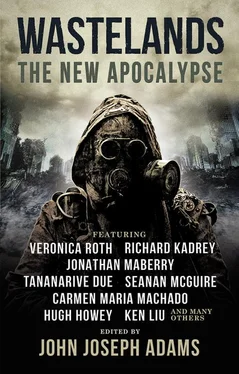“Kata?” the Echo said, scrunching her nose as she peered at Kata. She moved like Erszi had, all hunched and loping, no grace to her at all. Kata blinked away tears.
“You remember,” Kata said.
“It’s been a long time,” Erszi said, lifting a hand to touch Kata’s cheek. She couldn’t truly touch anything, of course, but her faintly glowing fingers hovered next to Kata’s face.
“Too long,” Kata said. “What did you do, Erszi?”
Erszi’s smile slanted into her cheek. She put her hand down.
“You already know, or you wouldn’t ask the question that way,” Erszi said.
“You had a weapon,” Kata said. “The others, your friends, they told me.” The other Echoes were lined up in the drawer just beneath the dock, labeled with Kata’s messy handwriting.
“A weapon that was harmless to humans, and deadly to sylphs,” Erszi said. She clasped her hands in front of her and looked up, as if to the heavens. “A clean slate for us. No progs. No sylphs. No self-aware computers left to destroy us.”
Kata saw the flash of light that meant Drobo was listening, but he said nothing.
“You would have killed every last one of them,” Kata said.
“You can’t kill something that isn’t truly alive,” Erszi said. “ We are alive. Lungs and beating hearts. Pain and decay. Birth and growth. Those things are life. I wanted to shut down all the machines, yes. I wanted a better life for our next generation. But I wasn’t able to send the virus in time…” A grimace of pain across her glowing face. “And they attacked, instead.”
“And now Earth is destroyed,” Kata said.
“With the sylphs still around, it may as well be destroyed,” Erszi said, and she hummed a little. “We lost, and so now our time is over.”
“Why did you make an Echo, then?” Kata scowled at her. “If we’re a dying species, why bother preserving us in any way?”
“So that what we’re becoming will remember what we once were,” Erszi said. “We won’t die as we were supposed to, like animals limping off into the woods. We will die by becoming like them. Look at you, Kata.” She nodded to Kata’s right hand, covered now with her long sleeve. “How much of you is flesh and bone? Fifty percent, maybe?”
Sixty percent was the answer, but Kata didn’t speak it aloud.
“How do you know what they put in your head hasn’t changed you?” Erszi said. “How do you know that what you feel is the same as what I feel?”
Kata had been born with a wasting disease. Bones rotting away from the inside. In a constant state of rapid decay. She would not have lived past fifteen if they had not done the surgery that wrapped up her bones in metal and replaced some of her limbs with circuitry, with an implant in her brain to control it all.
You will never come back from that , Erszi had said. I will mourn you as if you were already dead. Come home and die in peace, with us, as yourself .
Fuck you , Kata had replied. Because she had wanted to live, and it was all well and good to speak of passing away “in peace” when you weren’t the one who had to do it.
“I know that I will never feel the same things you feel,” Kata said. “Because what you felt started a war.”
With that, she left the main deck of the ship, climbing up the ladder to her quarters near the engine room, and laid down on her little slab of a bed.
“She wasn’t what I expected ,” Drobo said to Kata.
“She wasn’t always like that,” Kata replied. “She used to carry me around the house on her back, when I couldn’t walk anymore. She let me feed her carrots, like a horse.” She laughed a little.
“And this was… meaningful to you?”
“Yes.” Kata closed her eyes. “Can you leave me alone for a little while?”
Drobo let out an affirmative chirp, and went silent.
Kata held her hand up to the light. Though artificial and constructed of metal, it was finely made, so she was still capable of deft, delicate movements with her metal fingertips. It didn’t look like a human hand—she hadn’t been interested in the added expense—but was, in every functional way, equal to one.
Her original hand had been amputated at the elbow. Better to just start fresh, the sylph surgeon had said. She didn’t feel this one, of course, but it sent pulses to the implant in her brain, so she had been able to learn its position in space, a new kind of sensation. Her brain had mapped it with the implant, the same as it had her old body.
And was it so different, really? The brain dealt exclusively in electrical impulses between neurons, a crackling thundercloud that made a human being think. Whether those neurons were synthetic or not, connected by myelin or wire, they were all creatures of pulse and impulse, all the same.
* * *
The fueling outpost between Earth and Mars was lit up in all colors of the rainbow, flashing and glittering. GIRLS GIRLS GIRLS! pulsed in Kata’s mind even after she closed her eyes to shut out the assault of advertising for a moment. The male strip club across the way favored a subtler approach; Kata had once wandered in by mistake seeking an actual sausage. Needless to say, she had not found one.
The scent of fried food made her mouth water, but she had her small loyalties. She walked past the funnel cakes and French fries and shrimp tempura to the little cart at the end, staffed by a wrinkled Polish woman selling pierogi. They never spoke to each other, really; neither knew the other’s best language, so they had to conduct their transaction in English. But Kata always came for one spinach, one potato and cheese, and one strawberry for dessert.
She walked with the pierogis on a paper plate through the rest of the human quarter, a place designed to meet the needs of the flesh. Grim, dirty “motels” for sleeping; hot food for eating; strip clubs for desire; broken-down pharmacies for medicine; sly side counters for drugs. Then she passed through an empty stretch with piles of discarded boxes and bundles of barbed wire, and suddenly found herself confronted by two lines of guards.
The first were human, dressed in black, protective vests thick with tech, helmets, boots. She kept her head down as she passed them. Five meters away, facing her, was a line of sylphs.
Sylphs had once looked like humans, because humans had made them, perfected them for an increasingly broad range of tasks. But since the first sylph war—which resulted in them establishing a colony on Mars and declaring their independence—they had been manufacturing themselves, and many of them had decided they had no interest in looking human. They were human oid , of course—since so much of the technology they used was made for articulated fingers and hands, for bodies that stood less than a meter wide—but apart from that there was room for endless variation. Heads shaped like pyramids; impossibly long legs that bent backward like a goat’s; mouthlike orifices set in the chest instead of the head. There were few limits to what she saw before her. Functionality seemed to be the main priority, but it was not the only one. Creativity, self-expression, self-indulgence—there was room for that too.
Kata approached the one she knew, an obelisk on stilt-legs that called itself Hal (an homage to a fictional robot, she assumed, like many sylph names).
“Hey, Hal,” she said.
“Kata.” Its voice came from a series of slits on its chest, right at the level of Kata’s ears. “Here on business?”
“As always,” she said. She took out her ID card, an old flimsy thing with permanent smudges at the corners. He gave it a glance, and, with an elegance that never failed to surprise her, stepped back to let her through.
Читать дальше


![Nick Cracknell - The Quiet Apocalypse [= Island Zero]](/books/28041/nick-cracknell-the-quiet-apocalypse-island-zero-thumb.webp)









